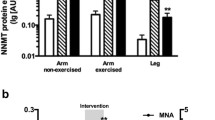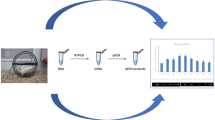Abstract.
The uncoupling protein homologs UCP2 and UCP3 have been proposed as candidate genes for the regulation of lipid metabolism. Within the context of this hypothesis, we have compared, from fed and fasted rats, changes in gene expression of skeletal muscle UCP2 and UCP3 with those of carnitine palmitoyltransferase I and medium-chain acyl-CoA dehydrogenase, two key enzymes regulating lipid flux across the mitochondrial β-oxidation pathway. In addition, changes in gene expression of peroxisome proliferator-activated receptor gamma, a nuclear transcription factor implicated in lipid metabolism, were also investigated. The results indicate that in response to fasting, the mRNA levels of UCP2, UCP3, carnitine palmitoyltransferase I and medium-chain acyl-CoA dehydrogenase are markedly increased, by three- to sevenfold, in the gastrocnemius and tibialis anterior (fast-twitch muscles, predominantly glycolytic or oxidative-glycolytic), but only mildly increased, by less than twofold, in the soleus (slow-twitch muscle, predominantly oxidative). Furthermore, such muscle-type dependency in fasting-induced transcriptional changes in UCP2, UCP3, carnitine palmitoyltransferase and medium-chain acyl-CoA dehydrogenase persists when the increase in circulating levels of free fatty acids during fasting is abolished by the anti-lipolytic agent nicotinic acid – with blunted responses only in the slow-twitch muscle contrasting with unabated increases in fast-twitch muscles. Independently of muscle type, however, the mRNA levels of peroxisome proliferator-activated receptor gamma are not altered during fasting. Taken together, these studies indicate a close association between fasting-induced changes in UCP2 and UCP3 gene expression with those of key regulators of lipid oxidation, and are hence consistent with the hypothesis that these UCP homologs may be involved in the regulation of lipid metabolism. Furthermore, they suggest that in response to fasting, neither the surge of free fatty acids in the circulation nor induction of the peroxisome proliferator-activated receptor gamma gene may be required for the marked upregulation of genes encoding the UCP homologs and key enzymes regulating lipid oxidation in fast-twitch muscles.
Similar content being viewed by others
Author information
Authors and Affiliations
Additional information
Electronic Publication
Rights and permissions
About this article
Cite this article
Samec, .S., Seydoux, .J., Russell, .A. et al. Skeletal muscle heterogeneity in fasting-induced upregulation of genes encoding UCP2, UCP3, PPARγ and key enzymes of lipid oxidation. Pflugers Arch - Eur J Physiol 445, 80–86 (2002). https://doi.org/10.1007/s00424-002-0879-9
Received:
Accepted:
Issue Date:
DOI: https://doi.org/10.1007/s00424-002-0879-9




